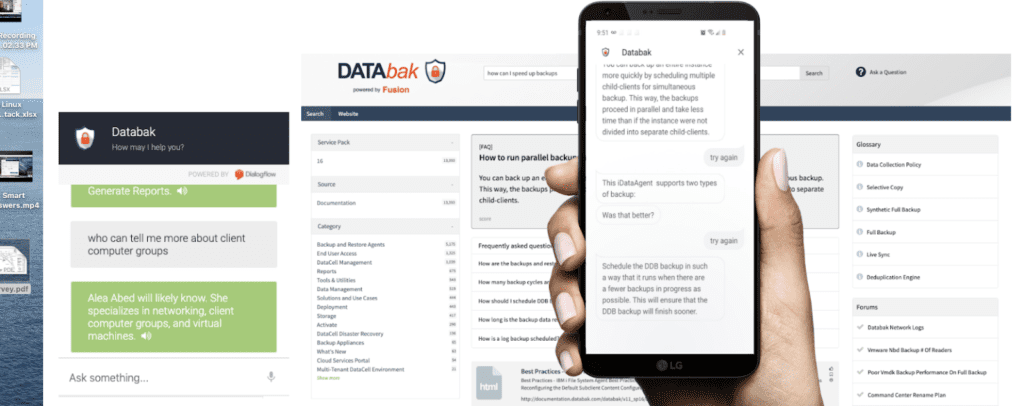How to Answer Never-Before-Asked Customer Questions, Virtually
The theme for 2020 seems to be: “Things that have never happened before, all happening at once.” Businesses that looked down on remote work are realizing it’s not so bad after all, stores (even grocery stores!) are pouring resources into their online platforms, and overburdened support centers are getting questions that have different answers depending on the WHO guidelines of the week.
Here at Lucidworks, we are helping our clients overcome these 3 challenges of the health crisis:
- A transition to more remote work
- A sudden surge in ecommerce, as shoppers avoid stores, and
- The burden on contact centers for customer and employee support.
Today we’ll focus on the last two bullet points and how we’re helping our customers scale their digital experience for a growing online customer base.
New Shoppers, New Opportunities
The US ecommerce industry experienced 10 years’ growth in 3 months at the beginning of the health crisis. Now five plus months into the pandemic, the acceleration of online shopping should come as no surprise. There has been a significant influx of first time online shoppers, existing customers are shopping with increased frequency, and customers are shopping online for a wider assortment of products that they were previously purchasing in stores.
The US Department of Commerce explains that 75% of US consumers have tried different stores, websites, or brands during the COVID-19 crisis and 60% of these consumers expect to integrate the new brands and stores in their post-COVID-19 lives. As a digital commerce company, you want to make sure that these consumers pick your brand to keep in their lives going forward. But where do you even begin?
Scale Support With Chatbots
Predictive chatbots and virtual agents dominate the category of “Most Useful AI/Automation Technologies for Personalizing Customer Interactions”, according to Forrester.
Having a robust chatbot or digital assistant solution is crucial to provide personalized and relevant experiences to maintain customers and account for the fresh customers shopping your website for the first time.
Lucidworks Smart Answers is helping companies enhance their chatbots and virtual assistants to meet the needs of an increasingly diverse customer base.
Shoppers are calling out for online support not only to help them find updated return policies, but as a place to access knowledgeable staff. We miss out on getting advice at places like The Home Depot and goop where it’s easy to get a trusted opinion on the best all-purpose drill for a hardware novice or the most moisturizing clay face mask at an affordable price. While it’s likely customers aren’t clogging up phone lines asking these types of questions, having a chatbot that can answer them, and scale across the thousands of users that are online at any given moment, provides the type of experience that people will come back for— similar to how you go back to a personal shopper that has all the answers and products you desire.
A poor chatbot experience leads to customer frustration which can quickly turn to customer churn and less engaged or loyal customers, sending them into the arms of your competitor. All of these consequences directly impact how much revenue is generated from online sales.
Answer Questions That Haven’t Been Asked Before With Smart Answers
With new customers experiencing your site for the first time, and current customers trying to make sense of ever changing store policies, shipping timelines, and return policies, chatbots face many unforeseen questions. Traditional chatbots struggle with paradigms like this because they are heavily scripted or rely on keyword matches to retrieve answers. This means if you’re not typing in a question that lives word-for-word on an FAQ sheet, it’s unlikely you’ll get an accurate response.
Lucidworks Smart Answers technology was built with challenges like this in mind. Smart Answers leverages both pre-trained models trained on vast public knowledge domains, such as Wikipedia, and custom models trained on customer knowledge bases. With the benefit of being able to draw from both public and customer-specific knowledge bases, Smart Answers creates models that are able to generalize in order to answer questions that were not part of the training data fed into the creation of the model. This generalization mitigates the need for interactions between a chatbot and a customer to be scripted or follow an exact pattern. That is to say, Smart Answers will rarely be ‘stumped’ by a customer question.
Unburden Call Centers With Chatbots That Can Understand Natural Language Questions
By using deep learning methodologies in addition to some of the key features that make traditional Fusion search great, Smart Answers is also able to tackle the other main challenge that traditional chatbots face: long tail queries. Long tail queries are the technical term for how we would normally ask questions in conversation. For example, if I get someone on the phone to answer a question that was complicated enough to warrant me sitting on hold for 25 minutes, I’m probably going to have a longer form question that includes context and purchase history.

I’m going to explain, “I’m having issues with my return because it’s technically 1 day outside of the return window, but the delivery was delayed so I was wondering if I can get an extension?”
A standard virtual assistant or chatbot would need me to say: “extension on return policy” to get the answer I need directly from the FAQ.
When customers pose long worded questions, traditional chatbots hit their limitations due to heavily scripted dialogue and the reliance on keyword search. With Smart Answers, answers are enhanced when long tail queries are entered. Smart Answers is able to understand the implicit context from long tail queries and extract the most important concepts. This parlays into the right contextualized answers being returned across various sources.
Avoid Compounding Consequences of Poor, Unscalable Customer Support
While this boon in the ecommerce industry has created great opportunity for companies to capitalize on, without the proper measures in place, it can lead to great opportunity lost. And the divide between companies with performant digital experiences and those without is rapidly increasing. Since the start of COVID-19, the gap between the top performing companies and the bottom has increased from $1600 billion in profit to $2300 billion, a 30% jump!
The consequences of having a poor digital assistant or conversational chatbot solution can be detrimental to your business. Make the most of every customer visit by providing fast and relevant customer support. The online brands that manage to engage and delight customers now could win new, lifelong fans. Learn how Smart Answers can enhance your chatbot to improve customer care and call deflection.